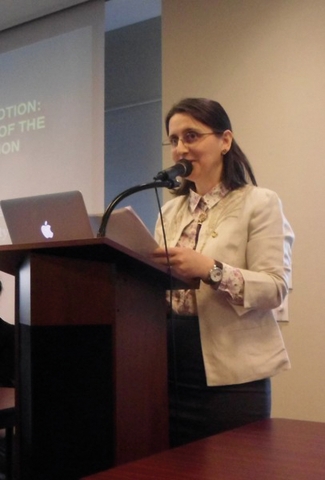A Georgian NYC Based Psychotherapist Talks Coronavirus
Interview
Angelina Akhvlediani (PhD, LMHC) is a Georgia-born mental health professional now based in New York City. In her 22 years of practice, she has specialized in anxiety, depression and relationship issues, but she recently had to switch to an unusual platform to counsel her patients – remotely. At time of writing, the state of New York has 149,316 confirmed coronavirus cases, a lot of those in the doctor’s home district of Brooklyn. While 13,000 have already recovered, 6,268 have died from the virus. In an interview with GEORGIA TODAY, Dr Akhvlediani talks about the NYC rush, the social recession, and gives tips on dealing with the anxiety of self-isolation.
What can you tell us about how NYC is handling coronavirus?
Sadly, the streets in Brooklyn and all throughout NY still seem busy. There is a mountain of evidence showing that social distancing is the only way to protect ourselves and everybody around, but so far, it has not been much acknowledged by the people here. Until now, we thought that in any medical emergency, doctors would prescribe the needed medication or perform the necessary surgery, and the issue would be solved. Now, for the first time ever, our well established expectations/ideas how to deal with a medical emergency have had to change. Medication and surgery are being replaced by our own behaviour: the most sophisticated medicine today is self-isolation and social distancing. This is not something that is easy to adjust to, hence the crowded streets and devastating number of deaths. We have to remind ourselves that every behavior is a learned behavior and it is a must to start exercising social distancing. The notion that isolation is inconvenient and the desire to keep your routine as a mother, person of faith, or neighbor, needs to be reframed. It is not about how convenient or unpleasant social distancing is; it is about being responsible for your own health/protection, and by doing this, you can take care of others, from your loved ones to the doctors and nurses serving in the local hospitals.
New Yorkers are always rushing somewhere and now it seems like they are rushing to die. It doesn't matter how kind your intentions are when you go out, since the final outcome will always be the same: you either jeopardize your life, or someone else’s. We have to take responsibility for our actions, because now more than ever we can change the fatal outcome of this virus.
Do you know what the situation of Georgian immigrants is living in New York City? Many of them are staying in there illegally. Do they have access to medical care?
The current standard of care is the same for natives and emigrants, undocumented and documented patients.
What changes do you expect in people’s outlook as a result of COVID-19?
Like any other epidemic, COVID-19 can have a strong impact on mental health. We can expect to see a significant increase in anxiety and depression, and a wave of PTSD.
Has the demand for psychological help increased since the virus emerged in the United States?
The Office of Mental Health in NY very swiftly moved to telemedicine, and patients did not have any gap in their treatment. The requests for possible treatment are rising. I don’t have the exact numbers, and it’s likely even the OMH doesn’t have them yet. The reality is that patients with anxiety are in stress mode on a daily basis, which makes them more “ready” for real crises. Also, a large number of people with different mental challenges were already receiving treatment, and their rational coping strategies have been developed at some level. This is why you won’t see much immediate change. The results of the current pandemic’s effect on mental health will be more apparent 3 to 6 months from now.
How can we better cope with the anxiety that comes with self-isolation?
I would advise to look at social distancing and isolation in perspective; to constantly remind yourself that you do it for a greater purpose and that you’re saving your life and your loved ones’ lives. We are social creatures and we need social interaction and face-to-face relationships, which is strictly limited in isolation. We need to try our best to stay active, do small tasks, reach out by using modern technology as much as possible, bring back an old, forgotten hobby or develop a new one, read the book you wanted to read two years ago...Again, we constantly have to remind ourselves that it is not about if social distancing is fun or not, it is about the reality that it doesn’t matter how difficult and unpleasant isolation is, it still is the only way to survive right now. The emotional complications which will follow social distancing can be dealt with and treated, so we can't downplay the need for isolation because of this.
What is “social recession” and what can the outcomes of it be in the post-pandemic world?
Social recession is a term similar to economic recession and presents the impact of a pandemic on mental health. People cope with their stress through their personal relationships, which are on hold now. We have a sense of belonging to our family, work, faith, or friend groups. Our ‘normal’ is to be engaged in relationships with all those groups. Of course, changing all of this will have an effect on our emotional well-being. This is why it’s so important to reach out, and to be connected virtually as much as possible. There is no question that face to face relationships are better, but we do not have the luxury to choose what is better; we need to figure out how to survive.
By Nini Dakhundaridze












